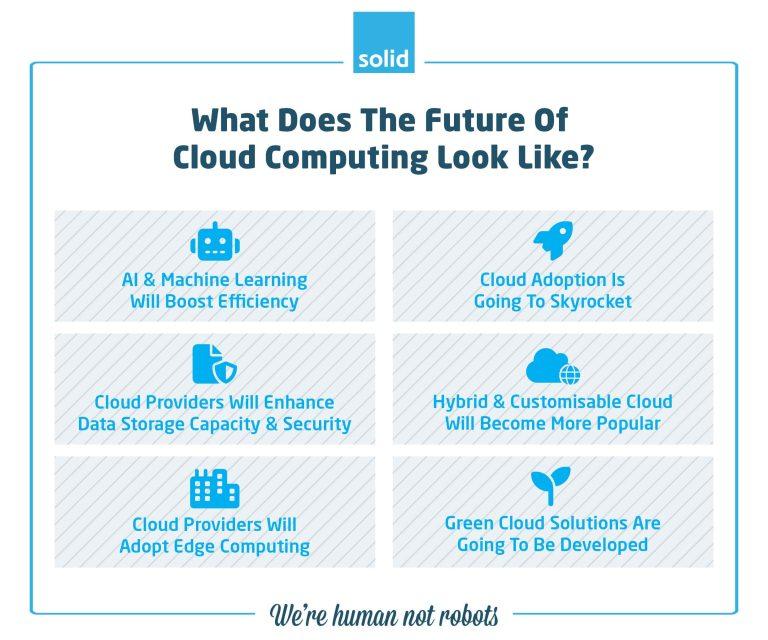
If your business isn’t using cloud services, we would say that you’re falling behind. But in reality, you’re already behind the curb. Cloud services aren’t just the future, they are the right now. Businesses that aren’t embracing cloud solutions are doing themselves a huge disservice, and are already being outdone in their markets. Because companies around the world are already embracing the flexibility, the security and the adaptability that cloud services provide.
We can talk on and on about the benefits of using cloud platforms, just as they are. But they are also moving forward in leaps and bounds. Looking at existing trends gives us insight into the future of cloud computing, and where we can see it progressing over the next two, five or ten years’ time.
Where Did Cloud Services Start?
Before we can look to the future of cloud computing, it’s always a good idea to look back at where we came from.
The concept behind the cloud computing industry, of multiple users accessing resources and data remotely, originated as early as 1963, when MIT received funding to develop a computer that could be “used by two or more people, simultaneously”. Of course, this wasn’t referred to as ‘cloud’ at the time – the term itself took off in 2006, when Google’s CEO, Eric Schmidt, used it at a conference. MIT instead referred to it as virtualisation, which is still a concept that we embrace today, though the scope of what we imagine when we think of virtualisation is far beyond what the investors in the project could have imagined. They couldn’t have foreseen almost every person around the world having access to a computer that fits into the palm of their hand, with access to stores of information that would surpass the greatest libraries in the world.
The end of the ‘90s saw the first cloud-based services provider emerging in Salesforce, but only a decade later, there would be hundreds of companies providing their clients with cloud solutions to store their data, run their processes, and develop their apps. Fast-forward to the 2020s, and cloud solutions are quickly outperforming their on-premises counterparts, offering advanced capabilities and security to even the smallest of businesses at an affordable monthly rate.
What Does The Future Of Cloud Computing Look Like?
With technologies advancing at a rapid rate, we know that cloud computing is going to be a must-have for businesses over the next ten years. But we also know that the capabilities of cloud services are already increasing. The solutions that you are using today are going to be enhancing themselves over the coming years, and there are particular technologies that are going to play a big role in the development of solutions and define the future of cloud computing.
1. Artificial Intelligence & Machine Learning will Boost Efficiency
Over the past year, we have been introduced to Chat GPT and seen first-hand the power of Artificial Intelligence (AI). But this is only the beginning. Microsoft, for example, has been putting AI to use in their M365 apps since the early ‘90s, and have heavily invested in the machine learning behind Chat GPT, incorporating it into Bing search and Teams. Over the coming decade, AI is going to contribute significantly to cloud computing trends, and we are going to see a huge shift in the way that we work, the way that we gather information. AI is going to take the guess-work out of effective communication, out of data analysis, and so much more. And the result is that our productivity and efficiency is going to increase exponentially.
2. Cloud Adoption is Going to Skyrocket
There are already plenty of businesses around the world making use of cloud services. But as cloud computing capabilities advance, we expect to see just about every company and individual adopting the cloud in one way or another. Whether it’s personal or professional cloud storage, data analysis, virtual machines and infrastructure, cloud PBX systems, or any other of the multitude of cloud solutions that are available to businesses, we know that companies are going to be recognizing the benefits of migrating to the cloud in the coming decade.
3. Cloud Providers Will Enhance Data Storage Capacity & Security
As more users are migrating to the cloud, one of the emerging trends in cloud computing is going to be an increase in the capacity and security of cloud services. With adoption increasing as we expect it will, so will the affordability and availability of cloud solutions, allowing even more businesses to migrate onto the platform. And as more people and companies move towards cloud solutions, so cloud providers are going to need to offer advanced data storage capabilities, and the future of cloud computing security will need to become even more stringent in order to ensure that their services stay ahead of the market trend, and to convince prospects that they are the right provider for their business.
4. Hybrid & Customizable Cloud Will Become More Popular
Public and private cloud services each have their own pros and cons. On one side is affordability, and this is where public cloud solutions shine. Because resources are shared by multiple companies, the costs associated with them can be shared as well. But sharing resources comes with it’s own downfall – you have less control over the infrastructure itself and it’s maintenance, and shared cloud solutions are inherently less secure because more people have access to them. If one business’ data becomes compromised, there is the potential that your company’s data will be compromised as well. Private cloud services are a lot more controllable, and you are able to secure them yourself. But this comes at a much higher price point.
This is why the future of cloud computing is going to see hybrid solutions becoming more popular. Businesses are going to realise that it doesn’t need to be either-or when it comes to public and private servers. It can, in fact, be both. And with an increase in hybrid cloud clients, cloud service providers are going to start offering more customisable and flexible cloud solutions that will allow for an easier and more intricate transition between publicly and privately hosted cloud environments.
5. Cloud Providers Will Adopt Edge Computing
Being able to access all of the resources that you need to work from anywhere in the world is a huge advantage in today’s digital world. More and more, people are finding that remote and hybrid working are better fits for their lifestyle, and cloud services make this easy to manage. But the one disadvantage of existing cloud solutions is that, while people are able to access their resources no matter where they are, it often takes time to do so. It makes sense – if your data is being stored in a data centre halfway around the world, you’ll naturally experience latency and need to use more bandwidth to be able to access the information and platforms that you need to work effectively.
This is where edge computing comes in. It’s all about providing data centres and virtual resources that are close to where your business is. For example, if you’re based in South Africa, it would be useful for your cloud provider to have data centres in Cape Town and Johannesburg, rather than only having international facilities. This would mean that you would be able to access your resources far quicker than you would be able to if you were trying to access a data centre in London or San Francisco.
When we look at the future of cloud computing in 2025 and beyond, we expect that more cloud providers are going to be embracing edge computing and branching out to provide local services in locations around the world, which will in turn further the adoption of cloud services in new and exciting markets.
6. Green Cloud Solutions Are Going To Be Developed
Over the past few years, we have seen humanity as a whole becoming more conscious of their impact on the environment. People are choosing sustainability over convenience wherever they possibly can. And cloud computing as it is at the moment has a huge environmental impact. From infrastructure, to the cooling that it requires to operate effectively, to the electricity that it takes to just run data centres 24/7, cloud services are using a large amount of resources just to run.
One of the biggest jobs that awaits providers in the future of cloud computing is finding ways to minimise their impact on the environment. Companies like Microsoft have already made commitments to run a carbon negative, water positive and zero waste organisation by 2030, and that deadline is edging ever closer. As they get closer to reaching this goal, so other cloud service providers will follow in their footsteps, and we have high hopes that over the coming decade, we are going to see the environmental impact of cloud solutions improving.
What Role Does Solid Systems Play?
No business can operate for over 20 years without embracing change. At Solid Systems, we don’t just adapt to changing technologies – we embrace them, and help our clients to do the same. We learn from the latest technological advancements and future trends in cloud computing, understanding them to the fullest so that we can advise the companies that work with us on the best possible solutions to suit their needs. And it has become clear to us over the past few years that cloud services are the best solutions for businesses operating around the world in today’s digital economy.
Whether you are looking to migrate your data and infrastructure to the cloud, want to understand and invest in the right hybrid cloud solutions for your needs, need to up your cybersecurity across the board, or are simply looking for a cloud consultant to discuss your options with, Solid Systems is here to help you adapt to a cloud environment, and put cloud services to work for your business. Book a consult today, and let’s talk through your cloud needs.
Frequently Asked Questions (FAQs)
With the fast rate that cloud technology is developing, we already expect to see huge advancements in the field within the next two years. One of the biggest disrupting influences over the past year has been artificial intelligence (AI), and we expect that cloud service providers are going to be adopting AI and machine learning into their products and services in the coming year, which will see an already booming sector boost even further, and will catapult cloud adoption.
We have no doubt that this is the case. Cloud services are already being used across a multitude of industries, but there are plenty of businesses that have not yet realised the benefits of migrating to the cloud. With the advancements that we expect to see in cloud services over the coming year, we know that adoption of cloud services is only going to increase, and the advantages to using cloud solutions is only going to grow as well.
As cloud services make better use of artificial intelligence and machine learning, we are going to see even more incentive for businesses to migrate to the cloud. With this increased adoption of cloud solutions, we expect that the services cloud providers are able to offer are going to improve both in functionality, and in price. More users means that services will become more affordable, which in turn will lead to an increase in the capacity available and the security the cloud providers will need to provide to entice businesses to choose them as their provider.
The future for cloud services looks very bright indeed. With advances in artificial intelligence, enhanced data storage capacity and cloud security, hybrid cloud and customisable cloud solutions becoming ever more popular, and improved automation on the horizon, we expect that the cloud industry, which barely has two decades behind it, is going to be skyrocketing over the next 10 years.





